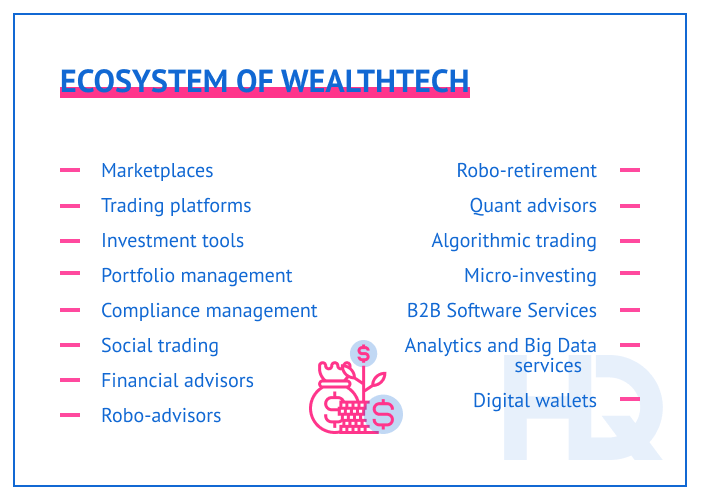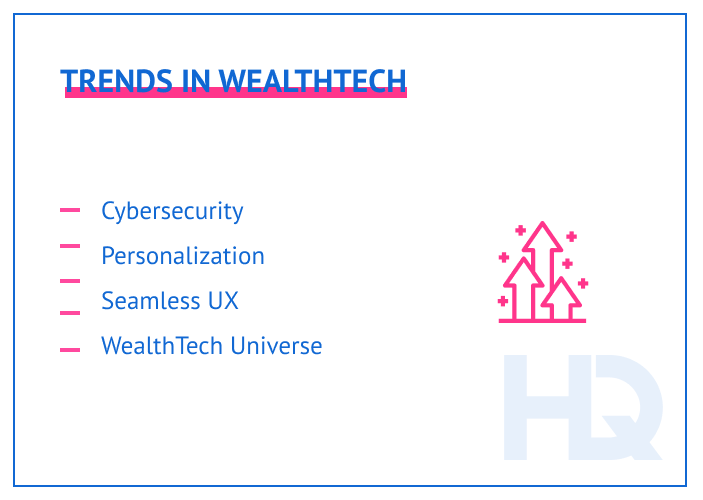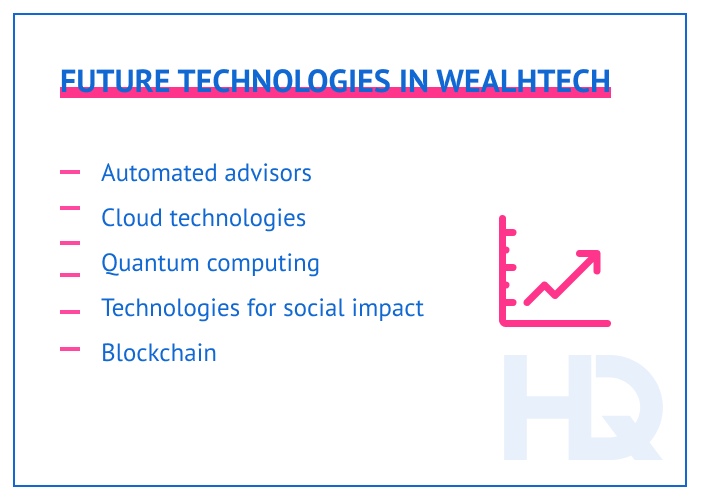According to GlobeNewswire, the wealthech, aka wealth management, technology market, will hit the $137.44 M mark by 2028, which shows how much these financial solutions are transforming the investment and asset management industry. In this article, we’ll give you the wealthtech market overview, as well as describe current and future trends.
Wealth Management Technology Market Overview
The wealthtech ecosystem democratizes certain activities that were previously exclusive to experts and promotes efficiency in financial processes. It has transformed the investment arena and disrupted ways of understanding modern finance. Take a look at the activities and services represented in the wealthtech ecosystem:

Marketplaces
Wealthtech marketplaces are centralized platforms, where financial advisors can select third-party investment models while retaining control of allocation, trade implementation, and rebalancing. Marketplace models in wealth management are emerging as a hybrid business model that offers a combination of digital and human engagement, helping advisors to focus more on client-building and retention strategies, while offering lower cost and retaining discretion.
Trading Platforms
Trading platforms in wealth management are suitable for users of any expertise level. They allow users to trade in multiple financial asset types, offer advanced financial chart comparison tools, provide research-backed analysis on financial markets and investments from top analysts, and are available on multiple devices.
Investment Tools
This category includes various types of software and services that provide comparison tools, research, and access to a network of advice. For example, such applications deliver financial market data updates, help customers find and connect with the service or product that suits their needs best, help with financial planning, as well as research and analyze investments.
Portfolio Management
Portfolio management solutions help investors and financial advisors unify and manage their investment portfolios in a single platform. The service offers innovative multi-asset class portfolio analysis for wealth managers and individuals, to manage the risk and performance parameters of their investments.
Compliance Management
Compliance wealthtech goes hand in hand with regtech — regulatory processes management within the financial industry, with the help of technological solutions. The two techs work together to ensure that all financial activities abide by regulatory requirements.
Social Trading
Social trading is a special type of investing that allows you to observe the way your peers and trading experts behave and follow their trading strategies, using mirror trading or copy trading. It’s a popular way to access financial markets, as it requires very little knowledge of the financial markets and saves money on hiring traditional wealth managers, although clients still need to open a trading account.
Financial Advisors
These companies specialize in offering financial and investment advice over the internet, based on extensive data analytics that they get from Big Data applications and Artificial Intelligence-based decision-making. Financial advisors are a more traditional form of wealth management that is being gradually replaced by robo-advisors.
Let’s create the future together – build a wealthtech innovative solution with HQSoftwareHQSoftware has a team of skilled professionals ready to tackle the project. Let’s talk!
Anna Halias
Business Development Manager,
HQSoftware
Robo-Advisors
Robo-advisors are automated services that use Machine Learning algorithms to offer financial advice or investment management online, with little to no human interaction. This service can offer customers ideal investment portfolios based on their risk preferences and the most profitable investment options in the market. Robo-advisors today replace or complement traditional financial advisors, as they can generate revenues through lower margins and higher volumes of transactions.
Robo-Retirement
This is another version of robo-advisors, used for managing consumers’ retirement savings. They offer Individual Retirement Accounts (IRAs) that either defer tax to retirement or allow capital gains to be tax-free at retirement. Robo-retirement services differ from human ones in that these platforms manage assets, create retirement portfolios, provide strategies, and recommend plans generated by a computer system.
Quant advisors
Another extension of robo-advisors consists of quant advisors. These systems deal with quantitative investing — the use of quantitative strategies to create mathematical models that ingest quantitative data from market feeds and other sources. The data is analyzed with the help of a computational model designed to exploit inefficiencies. When the code spots a positive trend or locates an inefficiency, it triggers the appropriate buys and sells.
Algorithmic Trading
This form of trading uses complex formulas and mathematical models combined with human oversight to make decisions to buy or sell financial securities on an exchange. Algorithmic trading can be used in a wide variety of situations — for example, order execution, arbitrage, or trend trading strategies.
Micro-Investing
Such platforms make it possible to save, deposit, and invest small amounts of money with no commission. It allows people to generate savings little by little, without having to shell out large amounts of money. Micro-investing platforms automate the process and portfolio management, based on your personal preferences. It’s common for micro-investing platforms to have a subscription-based or flat-fee payment scheme, which has provided an opportunity for more people to invest.
B2B Software Services
These are platforms that help advisors connect clients with unconventional investment types, including hedge funds, private equity, futures, and real estate. Also, B2B software services include the tools available via SDK, API, or web interface to help advisors compete with robo-advisors by allowing them to increase client communication, invest with less bias, scale operations, and find new clients.
Analytics and Big Data services
Such services include specialized analytics for B2B clients. Earlier, because of insufficient and unstructured data, financial services usually lacked insights and relied on manual analysis for suggesting investments. Today, with analytics and Big Data services, investment decisions have become much quicker and simpler.
Digital wallets
This software doesn’t only store all your payment details in one location. It is also designed to analyze and manage income sources and spending. Funds are stored in digital wallets throughout the funding period until the payout. This way, investors get one more level of safety.
Now that we have a big picture of the wealth management market, let’s take a look at the trends that are gaining popularity in 2022.
Trends in WealthTech

Cybersecurity, personalization, seamless UX, and the wealthtech universe are four trends demonstrating moves toward a client-centric approach, gaining better client engagement, and building loyalty.
Cybersecurity
Wealth managers and advisors use digital channels on a large scale and manage growing amounts of confidential and sensitive data from their clients. Cybercrimes are increasing and becoming more sophisticated, forcing wealth managers to invest more effort in meeting cybersecurity requirements and managing security risks.
There are various options to mitigate security risks in 2022, such as:
- AI and Machine Learning to detect potential threats;
- Cloud-based delivery models that make the controls more consistent;
- Biometric solutions to add another layer of security, and two-factor authentication.
Personalization
Today, customers are used to content and functionality being delivered to them on demand, according to their specific needs. They expect the same quality of service from wealth managers. Customers are ready to share their data if they get a tailored experience. Wealth management service providers, in turn, search for solutions to make the collected data work and generate value by employing Big Data analytics, Artificial Intelligence, and Machine Learning algorithms.
Seamless UX
A good user experience has become an increasing priority, as people prefer interacting with advisors through digital channels and expect the experience to be convenient, seamless, and easy. Users in this sector expect all the operations to be easily performed, irrespective of their technology knowledge, so UX should exclude any ambiguous solutions to avoid errors.
This is all the more important as self-service grows in popularity.
WealthTech Universe
Wealthtech universe is a collaboration between technology companies and other institutions involved in deploying new solutions within the wealth management industry. The participants include:
- Startups that bring disrupting ideas that get access to funding and new markets.
- Wealth managers/corporates who adopt new technology solutions and engage more clients, and extend their reach.
- Investors who invest in startups with long-term prospects
- The community that benefits from sustainable investing, as people prefer to be aware of the human and environmental costs of the return on their investment.
Changes in technology are fast-paced, and current trends will soon become obsolete. To get a sneak peek at the future, let’s discuss the wealthtech technologies that are going to dominate the financial sector tomorrow.
Future Technologies in WealhTech
The wealthtech sector is evolving every year and involves far more than simple predictive analysis. Technology has transformed how wealthtech companies are building relationships with prospective clients, reaching large audiences in a short time. It has also influenced the way existing relationships are managed. For example, wealthtech companies can track their clients’ investments. This is useful when a client has multiple assets under management in various institutions. Here are some technologies that have the potential to disrupt wealthtech in the future.

Automated Advisors
People today still tend to opt for professional financial advisors. However, wealthtech companies actively build robo-advisor solutions, which results are satisfying enough to make them the primary source of all sorts of financial advice.
Cloud Technologies
Almost all wealthtech platforms are cloud-hosted services today. What’s more, as the global regulatory environment is changing, cloud-based services make it easier to maintain such platforms. Wealth management firms are making their services available via mobile apps to increase engagement.
Quantum Computing
Quantum computing will help to model complex business situations in the future. Mathematical models used for analysis often make overly simplistic assumptions. Quantum computers, in turn, will help the wealth management sector overcome challenges associated with financial research.
Technologies for Social Impact
With the rise of social media, concern for social impact has become another trend in wealth management. Multi-channel service delivery is becoming increasingly important as the younger generation is ready to adopt it. Meanwhile, the new generation of investors is concerned with the social and environmental impact of their investments. Thus, wealthtech companies whose practices hurt society and the environment will cease to exist.
Blockchain
This technology can not only assist in asset management but can also create new classes of assets. Blockchain is also important to the wealth management industry because it can act as a digital wrapper around any asset and allows the exchange of those assets on decentralized networks.
For the Finale
The wealth management market is becoming increasingly digitized and accessible to a wider range of consumers due to wealthtech. It is evolving towards providing more client-centric and personalized services, as well as adding value to the offerings made by wealth managers and advisors. HQSoftware is ready to offer fintech consulting services and share our expertise in making fintech and wealthtech solutions. Contact us to find out how we can help your business!

Technology Researcher
Professional researcher at HQSoftware. Interested in solutions for retail, entertainment, and software that makes people's lives better.
Frequently Asked Questions
What is wealthtech?
What are the use cases of wealthtech?
What impact does wealthtech have on wealth management and the financial advice industry?
What is the state of the wealthtech market?
What are the advantages of using robo-advisors?
What are examples of wealthtech software?
How much does it cost to develop wealthtech software?
We are open to seeing your business needs and determining the best solution. Complete this form, and receive a free personalized proposal from your dedicated manager.

Sergei Vardomatski
Founder






